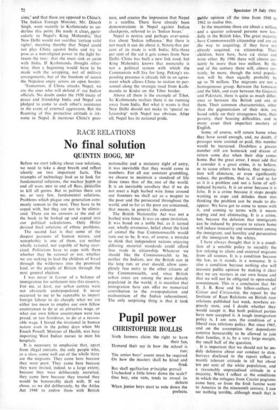INDIA
Angry border
KULDIP NAYAR
New Delhi—The Hindus have no Pope. If they had one, he would have tried to bring
about a rapprochement between Nepal and India, two religiously similar countries which are falling apart because the other ties binding them together have worn thin.
There is no demarcated border between them: but this free access has become a point of irritation to India. It suspects that Nepalese manufacturers are misusing the trade and transit treaty of 1960 to jump New Delhi's tariffs and sell duty-free goods
in India at a premium. Responsible Nepalese officials admit this may be true—but point out that the entire exports of their country in 1967-68 only amounted to fl 1 million. In the past trade across the border has seldom given rise to complaint. But then India and Nepal did not have China looking over their shoulders. Now Kathmandu is questioning every old treaty or arrangement with New Delhi to prove to Peking its neutrality and independence.
For example, after the Sine-Indian con- flict, in October 1962, New Delhi set up fifty-odd checkpoints on the Nepal-Tibet border, to learn more about Chinese troop movements. For some time these posts re- mained unnoticed; but then Peking began urging Kathmandu to have them dis- mantled. Now Nepal has formally asked India to remove them. Again, an Indian military liaison group has been function- .ing in Kathmandu for many years. Its main job has been to recruit Nepalese Gurkhas for the Indian forces. Since 1965, it has also been ensuring the implementation of a hitherto unpublicised military agreement, which forbids Nepal from importing arma- ments other than those of Indian origin. Now Nepal's Prime Minister, Mr Kirtinidhi Bista. has said in a statement that Kath- mandu regards the 1965 military agreement as having lapsed; he has also demanded the withdrawal of the military liaison group.
New Delhi has not up to now taken these threats seriously. They are regarded as out- bursts either under political pressure from within, or from the Chinese without. Never- theless India is anxious to explain to Nepal that the two countries have common 'basic aims,' and that these are opposed to China's. The Indian Foreign Minister, Mr. Dinesh Singh, went recently to Kathmandu to un- derline this point. He made it clear; orti- cularly to Nepal's King Mahendra, that New Delhi would not sacrifice 'certain valid rights', meaning thereby that Nepal could not play China against India and try to pose as a non-aligned power in the fight be- tween the two: that she must sink or swim with India. If Kathmandu thought other- wise, then a beginning would have to be made with the scrapping, not of military arrangements, but of the freedom of access the Nepalese enjoy across an open border.
'Tomorrow, if China attacks Nepal, we are the ones who will defend it' say Indian officials. No doubt under the 1950 treaty of peace and friendship India and Nepal are pledged to come to each other's assistance in the event of external aggression. But the flaunting of this protective attitude is irk- some to NepaL It increases China's pres- sure, and creates the impression that Nepal is a satellite. There have already been demonstrations in Nepal against Indian checkposts, referred to as 'Indian bases.'
Nepal is restive and perhaps over-sensi- tive about 'Indian influence.' But there is not much it can do about it. Ninety-five per cent of its trade is with India; fifty-three per cent of the aid it gets comes from New Delhi. China has built a new link road, but King Mahendra knows that monarchy is not a political system with which the Communists will live for long. Peking's ex- panding presence is already felt in an agree- ment which allows China to station its per- sonnel along the strategic road from Kath- mandu to Kodai on the Tibet border.
Above all there is the example of Tibet. So Kathmandu realises there is no running away from India. But what it wants is that New Delhi should not make its 'special re- lationship' with Nepal too obvious. After all, Nepal has its national pride.



































 Previous page
Previous page